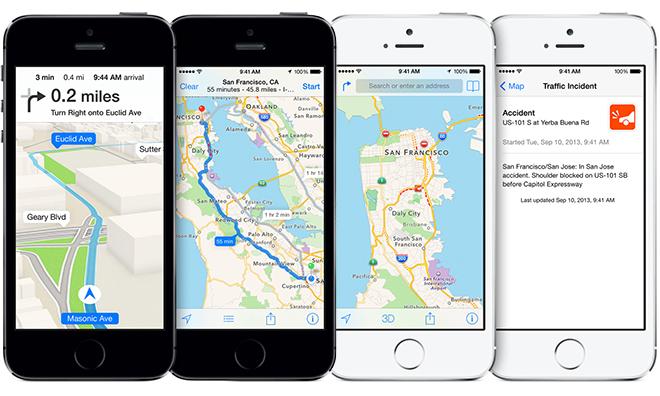California court ruling frees drivers to use map apps on cellphones
Last updated
A California state appellate court on Thursday reversed a ruling of a man who was ticketed for using a mapping app on his iPhone 4 while driving, opening the door to reform of the state's laws regarding cellphone use while driving.
In its decision, California's 5th District Court of Appeal ruled the state's laws are worded in such a way that does not prohibit drivers from using certain apps like mapping software while driving, reports The Associated Press.
In January of 2012, Steven Spriggs was issued a ticket by a California Highway Patrol officer for using his iPhone 4 while stuck in traffic caused by roadwork. Spriggs challenged the $165 fine, arguing his use of a mapping app to find an alternate route did not break state laws barring talking on a cellphone while driving.
After losing in both traffic court and the Fresno County Superior Court, Spriggs ultimately brought the case to the district appeals court. After review, the appellate court reversed the lower court's decision, saying the law leveraged by the CHP officer to cite Spriggs applied only to "listening and talking" on a cellphone, not other uses.
The case shines a light on laws designed to protect against distracted driving, which some critics argue are unclear or too narrow. While some states have strict "no touch" laws that make holding a cellphone while behind the wheel illegal, others have statutes similar to California's narrowly-worded "no talk, no text" rules.
With smartphones like Apple's iPhone, users have access to a wide variety of apps that can be useful while commuting. Others, like games, messaging apps and other attention-grabbing titles have the potential to cause accidents.
Spriggs said he wants existing laws to be rewritten in a way that is less vague and allows police officers to do their job more effectively.
"We're distracted all the time," he said. "If our distractions cause us to drive erratically, we should be arrested for driving erratically."
Thursday's ruling can be challenged on appeal by the state attorney general's office.
 AppleInsider Staff
AppleInsider Staff








 Amber Neely
Amber Neely
 Thomas Sibilly
Thomas Sibilly

 William Gallagher
William Gallagher
 Malcolm Owen
Malcolm Owen
 Christine McKee
Christine McKee










21 Comments
To check maps in the traffic jam is fine, I think. I am doing it sometimes while waiting for trafic light. And of course we need clearer regulations. I understand that people will continue using their cell phones regardless of the laws. I just hope that the number of people (who use their smart phones not very smart) could BECOME LESS. Those who use the cell phone while driving put ME in the much higher danger. !! Almost each 3d traffic crash is attributed to the cellphone usage. Texting increases crash risk by 800%! >>Washington, DC %u2013 The National Safety Council announced today that it estimates at least 28% of all traffic crashes %u2013 or at least 1.6 million crashes each year %u2013 involve drivers using cell phones and texting. >>...are manipulating their device in ways that include texting and from research reporting texting increases crash risk by 8 times Source: http://www.nsc.org/Pages/NSCestimates16millioncrashescausedbydriversusingcellphonesandtexting.aspx
This is a good thing. There needs to be some revision of the traffic laws to account for technology. As this case points out, not every use of the phone is the same. Cops will usually take the widest and most lucrative interpretation of the law. These laws need to be clearly spelled out so when the driver goes to court, he doesn't need to take it to the higher courts just to get a traffic ticket reversed.
So if you think you're going to get pulled over for using your cell phone while driving, just quickly launch the Maps app and say you were trying to navigate somewhere.
In another piece of news on the smartphone legal front police in Texas can't search your phone if you're arrested according to the Texas Court of Appeals http://arstechnica.com/tech-policy/2014/02/texas-appeals-court-says-police-cant-search-your-phone-after-youre-jailed/
I'm impressed this even went so far as to get an appellate court ruling. The fact that Mr. Spriggs invested so much effort to fight the ticket is to be lauded, because almost everyone else simply pays the "low" fine because it's easier than to fight. That's why we get very few court rulings on small traffic violations. It's just not worth it to the defendant, as the best they achieve is to get their fine voided.
In this case, it's a rational reading of the law and outcome. The law does not have a blanket prohibition on the use of cell phones while driving. It's non-hands free talking and texting. A ban on usage while sitting in traffic makes no sense and is not even realistically enforceable.